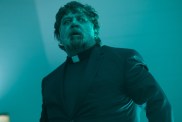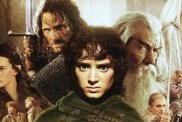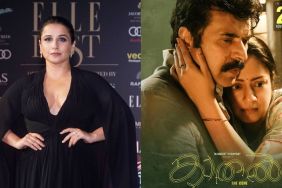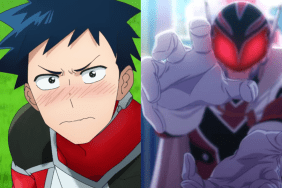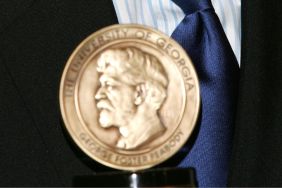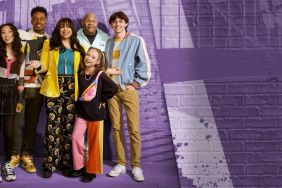Much of the promotion and marketing behind Joel and Ethan Coen’s Burn After Reading has been selling it for its two high-profile stars, George Clooney and Brad Pitt, for its comedy, as well as for it being the follow-up to the Coens’ Oscar-winning No Country for Old Men. Even so, the movie starts and ends with John Malkovich’s Osborne “Ossie” Cox, a CIA analyst fired from his job and bullied by his adulterous wife (Tilda Swinton) who is having an affair with a former secret service man (Clooney). In trying to get financial information for their impending divorce, she copies Ossie’s memoirs which includes government secrets onto a CD-Rom, a disc that’s soon lost then found by a pair of bumbling fitness center workers (Pitt and Frances McDormand) who try to blackmail the already down-and-out Cox into returning the top secret information.
It’s another great character for Malkovich, one that’s more sympathetic than some of the bad guys he’s played, but clearly a character with some anger issues and a really short fuse, so we get to see him explode more than a few times in the movie, often to hilarious results.
ComingSoon.net had a chance to sit down with the venerable actor at the Park Hyatt in Toronto where Malkovich is spending much of the week to do press for the three movies that are playing in the Toronto Film Festival.
ComingSoon.net: I understand the Coens wrote this part with you in mind. Had you met them before or had they just seen some of your other work?
John Malkovich: I met them at dinner years ago out in California, but I didn’t know them. I think it was just mostly from things they saw that I did, maybe on stage I imagine because they live in New York, and they may have seen things I did on stage.
CS: Is it flattering to have them write a character like this for you, a sympathetic character but one with a seriously bad temper?
Malkovich: I didn’t think much about them writing it for me because I wouldn’t really know what kind of character you’d write for me. I’ve done so many different kinds, I don’t really know what you’d pick out. I had always wanted to work with them and I liked this character and I thought the script was funny and good.
CS: Did they just send you the entire script as soon as they had finished it?
Malkovich: They called me before I got it and I talked to them and they told me they’d like to send it to me, and I said, “Fantastic,” so that’s how that came about.
CS: Woody Allen is another one of those filmmakers who every actor wants to work with and eventually gets a chance because he makes so many movies. Do you see the Coens to be similar in terms of actors having them on their list of filmmakers to work with?
Malkovich: I think everyone wants to work with Woody and I can’t imagine actors not wanting to work with the Coen brothers, but they’re not very similar the two… or the three I should say. As filmmakers, their process is not very similar.
CS: Oh, you’ve worked with Woody before?
Malkovich: Yes I have. It was called “Shadows and Fog.”
CS: Right, of course. In the past we’ve seen you play lots of bad guys, but recently, you’ve been moving over to play more sympathetic characters with flaws in recent years. I was curious if you’d seen many similarities between other characters you’ve played recently to the one you played in this movie?
Malkovich: Not so much. He doesn’t have much to do with the person I played in “The Changeling,” not much to do with the person I played in “Afterwards,” not much to do with the person I played in “Disgrace.” In “Disgrace,” they’re both educated, but “Disgrace” is kind of a tragedy and “Burn After Reading” is a comedy.
CS: Do you see this movie as a straight comedy? It has a lot of timely political things in there, almost like their version of a political thriller, but it’s being marketed like a straight comedy.
Malkovich: I think it’s a comedy with meanness. It’s not a comedy like some of the Hollywood comedies, but it’s not “Tropic Thunder” or “There’s Something About Mary,” but it’s a comedy. I don’t know if people call it a satire.
CS: In some ways, it does satirize the government and the CIA.
Malkovich:I wouldn’t say that’s a satire. It’s probably fairly accurate being satirized.

CS: So was everyone else cast already at this point?
Malkovich: As I remember yeah. Joel and Ethan may remember it differently, but I’m sure they told me about everybody they were thinking of and I think it was pretty much sort of together. Maybe the deals hadn’t been done, but they told me all the people they were approaching certainly. They wrote it for Brad to do, and George, and Frances, I don’t know about Tilda, but I know Richard Jenkins I think. So I had a pretty good idea of who was going to do what.
CS: Tilda Swinton is quite rotten to you the whole movie, which as I said, makes you more of a sympathetic character since you don’t really deserve the abuse. These things happen to you and she just adds to it. What’s it like being berated so much in this role?
Malkovich: Oh, you get used to it. If it’s Tilda doing it, you grow to like it.
CS: But you do get to punch Brad Pitt in the nose which I guess not many people can say they’ve done.
Malkovich: No, probably not.
CS: Is that actually your fist hitting him in the nose?
Malkovich: Yeah, sure.
CS: So what’s that like and how many takes did you do?
Malkovich: I can’t remember, but it was very smooth, and you know, he’s very good at that, but of course the person who punches you, you don’t do anything, it’s the person who receives the punch that matters, never the person that does it. I can punch this close to you fifty times, but if you don’t know how to react, depending on the camera angle it doesn’t mean anything.
CS: There’s a science to throwing a punch, so do you have a lot of experience with it?
Malkovich: Sure, yeah. but I’ve done it a lot, a thousand times. Fists, hatchets, guns, swords, epées…
CS: How hard is it to do that… I don’t want to call it slow burn because Ozzie doesn’t really have a slow burn.
Malkovich: A fast burn.
CS: He has a short fuse, I guess, but how hard is it to do that throughout a movie like you do in this one?
Malkovich: It’s not very hard. To me it’s funny. He just gets so angry about nothing and of course he does have… I mean I say nothing, but he is extremely unhappy. His father is a vegetable, his wife is divorcing him, he got fired from his job, and you know, he’s also an ass, and he can’t write. He wants to write a book, but you know he’s an idiot, and then he’s being blackmailed… and then they smash his car… and then his wife who locks him out of the house and throws his stuff in the rain. It’s without justification. It’s funny to me how angry he gets so quickly.
CS: How is something like that on page? Do they just write the words and tell you how they want it played? Is it at all like music with dynamic notations of when to go from calm to explosive?
Malkovich: I would argue that their text is so clear that it’s almost like it’s scored.
CS: As I said, you used to play a lot more bad guys and more recently it seems that people are allowing you to show other sides of yourself, like with “The Great Buck Howard” which was one of my favorite movies at Sundance this year and one of my favorite things you’ve done.
Malkovich: That’s very kind.
CS: Have you deliberately tried to do things in recent years that show other sides of you besides being able to play a bad guy?
Malkovich: No, because most of the films I’ve made aren’t in Hollywood, so they weren’t even released in America and I’ve done all kinds of things. If “Con Air” makes $300 million dollars and “Colour Me Kubrick,” which is a little English comedy I did recently, makes five dollars, it doesn’t mean I play bad guys, it means people see certain films. It’s not really about what I like or do, it’s about what they like. So they don’t want to see me play Gustav; it’s okay, but I did play it. I did it in the same way and with the same care that I did “In the Line of Fire,” but people want to see “In the Line of Fire” and they don’t want to see “Klimt.”

CS: It’s also a matter of studios having more money to market their films compared to the indies who have limited budgets to get their movies seen.
Malkovich: Of course, but I’m not blaming people I’m just saying, I never ever just play bad guys. I did it three or four times and it happened to be successful, but “The Glass Menagerie” did not make $300 million dollars, “Death of a Salesman” did not make $300 million dollars, “The Great Buck Howard” hasn’t made $300 million dollars. If you asked me what I preferred to do, I would say “The Great Buck Howard” or “Colour Me Kubrick,” without saying that I didn’t like doing “In the Line of Fire” or “Con Air.” Personally, I find “Con Air” rather funny, but for whatever reason, people prefer… let’s put it this way, they used to only like to see me have a hatchet, although they preferred for me to get killed with one, now they like to see me with a hatchet and a drink in my hand.
CS: Well, there you go… those people should enjoy this movie.
Malkovich: And in my underwear and in a bathrobe. Maybe their perception is filling out slightly. But you know, it’s hard when you’re an actor no matter how wonderful an actor could be–and I’m certainly not talking about me being wonderful–no matter how wonderful Mastriani can be, we’ll always think of him in “8 1/2,” and Al Pacino did “The Godfather” or Bill Hurt or any of these.
CS: Sure, it’s specific roles you remember them for. As far as yourself, do you have a role you look back upon and think, “This was a role that I nailed and it was the role I was born to play,” whether or not it was a movie that a lot of people saw or not?
Malkovich: I nailed “Colour Me Kubrick,” but it doesn’t matter.
CS: That was a very meaty character and Alan Conway was a very interesting person for sure.
Malkovich: Certainly, but because of some flaws in the film and things fall between the cracks and blah, blah, blah. I liked what I did in the “Klimt” film, it doesn’t mean the film works wholly at all on any level.
CS: I missed that one. That’s one of the movies that I really would like to see.
Malkovich: It doesn’t quite work. I was disappointed just to the extent that I wanted it somehow to be more… but it’s a director I absolutely love. I’d do anything with him. I’d do it again in a heartbeat and sometimes they don’t turn out the way you want them to turn out, but you have to remember, you’re not the director. It’s how they want them to turn out. And anything I ever did I’d try to do again in a heartbeat and try to do it better.
CS: You’ve played a lot of characters with overt eccentricities such as Alan Conway and Buck Howard. In this, you had a couple of scenes opposite Richard Jenkins, who’s done a couple of stranger roles and a couple of straight-forward ones. Do you ever see yourself doing that role where you just come in and be a normal guy?
Malkovich: I’ve done tons of them. I think people see me maybe… we’ll put it this way, people see me as a lot more complicated than I am and that may be something I communicate without intending to. To me, it’s an utterly erroneous impression, but it must be an impression.
CS: It does allow you to get some great roles though.
Malkovich: Sure, of course, but it means when you call Will Ferrell’s producer, they go, “What? Are you nuts?” and I don’t know why, but somehow that happened.
CS: You have a number of movies here at the Toronto Film Festival, including this one, but what’s “Afterwards” about? I don’t really know much about that one.
Malkovich: It’s kind of a romantic thriller about a young French lawyer who lives in America; it’s poetic and I play a kind of angel.
CS: Figuratively speaking?
Malkovich: Literally and figuratively.
CS: Who directed that?
Malkovich: A Frenchman called Gilles Bourdos and a really fine young French actor called Romain Duris. He’s wonderful, and Evangeline Lilly from “Lost” plays his wife.

CS: I’ve got to look for that one. Also, what was the Clint Eastwood experience like?
Malkovich: Fantastic.
CS: He does direct his own movies, but he’s also one of those directors where his entire resume sounds good. Always interesting.
Malkovich: Well, he knows how to make a movie. And I’m fond of him personally. I thought she was just terrific, Angelina Jolie, plays the lead and I love working with both of them and really all of my work was with them and it’s really nice.
CS: As an actor, do you feel more like you could work with any director at this point? Whether they’re experienced like the Coens or Clint Eastwood or someone making their first film? Do you feel you’ve mastered the craft to the point where you know what you can do and don’t have to worry about who is behind the camera?
Malkovich: There are a couple directors at least I’ve worked with that I just know I could never work with again. The mix just doesn’t work. But most of them that I’ve worked with, I feel like I could work with again and I’m always happy to meet new ones. Always.
CS: Do you have any idea when “The Great Buck Howard” will come out?
Malkovich: No, I know it’s been bought. I haven’t spoken to Tom Hanks and Gary Goetzman’s company in a while, but I’m going to look them up when I go out to L.A. to start rehearsals on a play in Mexico City in early October and I’m going to give them a holler.
CS: I hope they’re able to get it out by the end of the year for awards consideration.
Malkovich: Me too. I really liked that character. It was so much fun and they were so much fun to work for.
CS: Any other movies coming out?
Malkovich: One called “The Mutant Chronicles” and one called “Gardens of the Night.”
You can see John Malkovich get really angry in the Coen Brothers’ Burn After Reading which opens on Friday, September 12.

